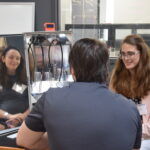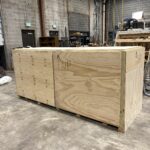Welcome to ’10 Questions with Root3 Labs’, a Root3 series where we take some time and give the spotlight to one of our team members to share a little about themselves, their work, and a little advice for other engineers. This month’s edition features Sr. Mechanical Engineer Conrad Laskowski.
Conrad’s passion for creation was first sparked using his grandfather’s tools while growing up in New Jersey. After sharpening his skills at the University of Maryland, Conrad gained professional experience designing and testing engineering solutions in the medical industry, with an emphasis on microfluidics. Before joining Root3 Labs, Mr. Laskowski was the Lead Mechanical Engineer for a company specializing in wearable indoor mapping and tracking technology for government and public safety personnel. Interestingly, Conrad has the rare distinction of appearing on several issued US Patents as “Inventor”, but on a separate issued US Patent as “Examiner”. Outside of engineering, Conrad is a competitive runner with the Falls Road Racing Team and USATF Level I Certified Coach.
Mr. Laskowski …
1. What led you to this career?
For as long as I can remember I’ve been a creative thinker and maker. I had a garage filled with my grandfather’s tools growing up. My grandfather repaired Flying Tigers in WWII and then owned his own business repairing and rebuilding web-fed printing presses everywhere from Virginia up into Canada. Having likely inherited his passion for mechanical systems, I would dream up something – anything – to make with his tools, and then see it through. When my parents recognized this trait in me, they encouraged me to look into engineering. I’m currently on year 14 of professionally-looking into it.
2. What’s one professional skill you’re currently working on?
Business development. Aside from my engineering pursuits, I have taken a growing interest in connecting with people who may need the services offered by Root3 Labs and navigating how best to foster those relationships. It is an art unto itself, but – like engineering – can lead to great and impactful results.
3. What do you want to be remembered for?
I gave my all to what I did and who I loved.
4. Do you see the glass as half empty or half full?
I see the bottom full of liquid and the top full of gas.
5. What upcoming technological innovation do you think will dramatically impact the industry in the next five years?
The collection of big data is already possible thanks to widely distributed, affordable sensing technology – think ‘smartphone in every pocket’ – but the challenges in efficiently filtering, processing, and gleaning meaningful information from mountains of data is an effort in engineering that is currently unfolding. I foresee the transition from brute-force “massive data gathering” to streamlined “meaningful knowledge gleaning” as a precursor to huge additional leaps in understanding our world and ourselves.
6. When working remotely, how do you manage your day?
I’ve been working remotely from client locations and the DC area for several years now, so this was not much of a transition for me. But to the newbies, remember that putting on pants every day is an acceptable and admirable substitute for a daily exercise routine.
7. Do you prefer coffee, tea, or both?
I’m the father of a 1-year-old at the time of writing this, so YES (intravenously).
8. What’s the biggest misconception people have about your position?
That I do something in construction like design HVAC or the auto industry and can repair their car, or at least their car’s AC. For free.
9. Would you rather be able to play 10 different instruments beautifully or speak 10 different languages fluently?
I play the drums but can’t speak any languages other than English and Nerd, so I’ll go with 10 different languages fluently. Plus, if I pick Italian and French, that’s sort of two beautiful instruments.
10. Any advice for aspiring engineers?
It gets tough sometimes. Don’t give up. The hard work is what makes it important. One of the beautiful things about engineering is that it is everywhere in our society and it is so broadly applicable. You will never regret having all the options that a degree in engineering will afford you, both in or out of engineering as a profession. Anywhere that a problem was solved, there’s a good chance an engineer was involved. (Especially if the problem also ended up with added features).
Thank You to Conrad Laskowski for participating in this month’s ’10 Questions with Root3 Labs’ series and stay tuned for more interviews with other employees at Root3 Labs.





